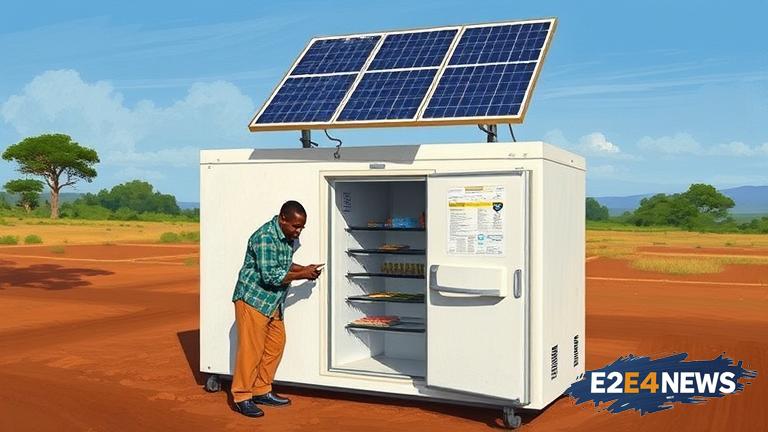In a groundbreaking move, Malawi has introduced a solar-powered vaccine delivery refrigeration system, aimed at improving vaccine accessibility and efficacy in rural areas. This innovative technology is set to revolutionize the way vaccines are transported and stored, particularly in areas with limited access to electricity. The solar-powered refrigeration system is designed to maintain the optimal temperature range for vaccine storage, ensuring their potency and effectiveness. This development is crucial in Malawi, where vaccine delivery has been hindered by inadequate infrastructure and limited resources. The new system is expected to increase vaccine coverage, particularly in rural areas where healthcare facilities often lack reliable electricity. The solar-powered refrigeration units are equipped with advanced technology, including temperature monitoring and control systems, to ensure the vaccines are stored at the correct temperature. This innovation is a significant step forward in the country’s efforts to improve healthcare outcomes, particularly in the prevention and control of infectious diseases. The introduction of solar-powered vaccine delivery refrigeration is also expected to reduce vaccine wastage, which is a significant problem in many developing countries. Vaccine wastage occurs when vaccines are exposed to temperatures outside the recommended range, rendering them ineffective. The new system will help to minimize this risk, ensuring that more vaccines reach their intended recipients. The solar-powered refrigeration system is also environmentally friendly, as it reduces reliance on fossil fuels and lowers carbon emissions. This is in line with Malawi’s commitment to reducing its carbon footprint and promoting sustainable development. The introduction of this technology is a testament to the country’s dedication to improving the health and wellbeing of its citizens. The solar-powered vaccine delivery refrigeration system has been made possible through a collaboration between the Malawian government, international organizations, and private sector partners. This partnership has enabled the development and deployment of the innovative technology, which is expected to have a significant impact on public health outcomes. The system is also expected to create jobs and stimulate local economies, particularly in rural areas where the refrigeration units will be deployed. As Malawi continues to roll out the solar-powered vaccine delivery refrigeration system, it is expected to serve as a model for other countries facing similar challenges. The technology has the potential to be replicated in other developing countries, where vaccine delivery is often hindered by inadequate infrastructure and limited resources. The introduction of solar-powered vaccine delivery refrigeration is a significant step forward in the global effort to improve healthcare outcomes and reduce the burden of infectious diseases. It is a testament to the power of innovation and collaboration in addressing some of the world’s most pressing health challenges. The solar-powered refrigeration system is expected to have a lasting impact on the health and wellbeing of communities in Malawi and beyond. As the country continues to innovate and improve its healthcare systems, it is likely to become a leader in the region, showcasing the potential for sustainable and effective healthcare solutions. The success of the solar-powered vaccine delivery refrigeration system will depend on various factors, including the availability of funding, the capacity of healthcare systems, and the level of community engagement. However, with the support of international partners and the commitment of the Malawian government, the project is expected to achieve its goals and improve the lives of millions of people. In conclusion, the introduction of solar-powered vaccine delivery refrigeration in Malawi is a groundbreaking development that has the potential to revolutionize the way vaccines are transported and stored. It is a testament to the power of innovation and collaboration in addressing some of the world’s most pressing health challenges, and it is expected to have a lasting impact on the health and wellbeing of communities in Malawi and beyond.
